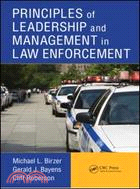Principles of Leadership and Management in Law Enforcement
商品資訊
ISBN13:9781439880340
出版社:CRC Press UK
作者:Michael L. Birzer; Gerald J. Bayens and Cliff Roberson
出版日:2012/03/26
裝訂/頁數:精裝/390頁
規格:24.8cm*16.5cm*1.9cm (高/寬/厚)
版次:1
定價
:NT$ 6825 元優惠價
:90 折 6143 元
若需訂購本書,請電洽客服 02-25006600[分機130、131]。
商品簡介
作者簡介
目次
相關商品
商品簡介
Effective police organizations are run with sound leadership and management strategies that take into account the myriad of challenges that confront today’s law enforcement professionals. Principles of Leadership and Management in Law Enforcement is a comprehensive and accessible textbook exploring critical issues of leadership within police agencies. Every chapter includes key concepts, definitions, chapter objectives, and review questions. Organized in logical fashion, each new chapter builds on previous material for quick assimilation.
Topics include:
The evolution of the modern police department
Leadership approaches and management theories
Organizational structure of a police department
Strategic short- and long-term planning
Business approaches, including Six Sigma and COMPSTAT
New technology such as computer-aided dispatch, vehicle monitoring, and crime mapping
Managing police stress and the work environment
Recruitment and training
Legislative issues impacting police, including Title VII
Policing in an era of advanced homeland security
Ethical issues
Suitable for a one-semester course, the book’s easy reading style minimizes the need for memorization and reinforces salient points through boxed highlighted areas. Written by three renowned criminal justice experts, this volume encourages readers to think expansively and develop new insights into the future direction of police leadership and management.
Topics include:
The evolution of the modern police department
Leadership approaches and management theories
Organizational structure of a police department
Strategic short- and long-term planning
Business approaches, including Six Sigma and COMPSTAT
New technology such as computer-aided dispatch, vehicle monitoring, and crime mapping
Managing police stress and the work environment
Recruitment and training
Legislative issues impacting police, including Title VII
Policing in an era of advanced homeland security
Ethical issues
Suitable for a one-semester course, the book’s easy reading style minimizes the need for memorization and reinforces salient points through boxed highlighted areas. Written by three renowned criminal justice experts, this volume encourages readers to think expansively and develop new insights into the future direction of police leadership and management.
作者簡介
Michael L. Birzer is Director of the School of Community Affairs and Professor of Criminal Justice at Wichita State University. His research interests include police training, police behavior, the intersection of race and the criminal justice system, and qualitative research methods (ethnography, phenomenology, and ethnomethodology). His non-academic criminal justice experience includes over 18 years of service with the Sedgwick County Sheriff’s Department in Wichita, Kansas, where he reached the rank of lieutenant. He earned his doctorate from Oklahoma State University,
Gerald Bayens is a Professor and Chair of the Department of Criminal Justice and Legal Studies at Washburn University. His research interests include law enforcement response to agro-terrorism, strategic planning and policy development, and community-based corrections. His non-academic criminal justice experience includes 22 years in criminal justice. His prior employment experience includes Director of Juvenile Corrections and Director of Adult and Juvenile Community Corrections, Shawnee County, Kansas; Special Investigator, Kansas Bureau of Investigations; Criminal Investigator, Shawnee County Sheriff's Office, Kansas; and Military Policeman, U.S. Marine Corps. Dr. Bayens has served as a professional consultant and trainer for many years in the area of quality management and human resource development. He has a Ph.D. in Criminal Justice, with interdisciplinary emphasis in political science, research methods, and juvenile justice administration, from Union Institute and University; an M.S. in Criminal Justice from The University of Alabama; and a B.A. in Criminal Justice with minor in psychology from Washburn University. Dr. Bayens has written several research articles and books including his latest, Research Methods in Criminal Justice (CRC Press, 2011) and Probation, Parole, and Community-Base Corrections (McGraw-Hill, 2012).
Cliff Roberson is an emeritus Professor of Criminal Justice at Washburn University. His previous academic experience includes Professor of Criminology and Director of the Justice Center at California State University, Fresno; Professor of Criminal Justice and Dean of Arts and Sciences at the University of Houston, Victoria; Association Vice-President for Academic Affairs, Arkansas Tech University; and Director of Programs for the National College of District Attorneys, University of Houston. His non-academic legal experience includes Trial and Legal Services Supervisor, Office of State Counsel for Offenders, Texas Board of Criminal Justice; private legal practice; judge pro-tem in the California courts; trial and defense counsel and military judge as a marine judge advocate; and Director of the Military Law Branch, U.S. Marine Corps. Cliff is admitted to practice before the U.S. Supreme Court, Federal Courts in California and Texas, the Supreme Court of Texas, and the Supreme Court of California. His educational background includes a Ph.D. in Human Behavior from United States International University; an L.L.M., in Criminal Law, Criminology, and Psychiatry from George Washington University; a J.D. from American University; a B.A. in Political Science from the University of Missouri; and one year of post-graduate study at the University of Virginia School of Law. In 2009, a research study conducted by a group of professors from Sam Houston State University determined that Cliff Roberson was the leading criminal justice author in the United States based on his publications and their relevance to the profession (Southwest Journal of Criminal Justice, Vol. 6, issue 1).
Gerald Bayens is a Professor and Chair of the Department of Criminal Justice and Legal Studies at Washburn University. His research interests include law enforcement response to agro-terrorism, strategic planning and policy development, and community-based corrections. His non-academic criminal justice experience includes 22 years in criminal justice. His prior employment experience includes Director of Juvenile Corrections and Director of Adult and Juvenile Community Corrections, Shawnee County, Kansas; Special Investigator, Kansas Bureau of Investigations; Criminal Investigator, Shawnee County Sheriff's Office, Kansas; and Military Policeman, U.S. Marine Corps. Dr. Bayens has served as a professional consultant and trainer for many years in the area of quality management and human resource development. He has a Ph.D. in Criminal Justice, with interdisciplinary emphasis in political science, research methods, and juvenile justice administration, from Union Institute and University; an M.S. in Criminal Justice from The University of Alabama; and a B.A. in Criminal Justice with minor in psychology from Washburn University. Dr. Bayens has written several research articles and books including his latest, Research Methods in Criminal Justice (CRC Press, 2011) and Probation, Parole, and Community-Base Corrections (McGraw-Hill, 2012).
Cliff Roberson is an emeritus Professor of Criminal Justice at Washburn University. His previous academic experience includes Professor of Criminology and Director of the Justice Center at California State University, Fresno; Professor of Criminal Justice and Dean of Arts and Sciences at the University of Houston, Victoria; Association Vice-President for Academic Affairs, Arkansas Tech University; and Director of Programs for the National College of District Attorneys, University of Houston. His non-academic legal experience includes Trial and Legal Services Supervisor, Office of State Counsel for Offenders, Texas Board of Criminal Justice; private legal practice; judge pro-tem in the California courts; trial and defense counsel and military judge as a marine judge advocate; and Director of the Military Law Branch, U.S. Marine Corps. Cliff is admitted to practice before the U.S. Supreme Court, Federal Courts in California and Texas, the Supreme Court of Texas, and the Supreme Court of California. His educational background includes a Ph.D. in Human Behavior from United States International University; an L.L.M., in Criminal Law, Criminology, and Psychiatry from George Washington University; a J.D. from American University; a B.A. in Political Science from the University of Missouri; and one year of post-graduate study at the University of Virginia School of Law. In 2009, a research study conducted by a group of professors from Sam Houston State University determined that Cliff Roberson was the leading criminal justice author in the United States based on his publications and their relevance to the profession (Southwest Journal of Criminal Justice, Vol. 6, issue 1).
目次
Introduction to the Modern Police Agency Management and Leadership Evolution of the Modern Police Department Police Reform Era War on Crime Era Community Policing How Does Community Policing Affect theRole of the Police Supervisor? Policing Styles Development of Police Management Theory Organizational Culture Questions in Review Biggest Mistakes Police Leadership Makes and How to Avoid Them Introduction to Management Theory Management Theory The Humanistic Management Approach Questions in Review Suggested Additional References and Links to the Web Operational Management of a Police Agency Basic Functions of a Police Agency Organizational Structure and Design Organizational Development Personnel Questions in Review Biggest Mistakes Police Leadership Makes and How to Avoid Them What Makes People Satisfied with the Police? What did the Researchers Find? Leadership Approaches Leadership Styles Which Leadership Style and When? Questions in Review Suggested Additional References and Links to the Web Planning, Implementation, and Evaluation What is Planning? Strategic Planning Types of Plans Other Miscellaneous Plans Factors in Planning Evaluation Questions in Review Biggest Mistakes Police Leadership Makes andHow to Avoid Them What Does Management Expect from Subordinates? A Business Approach to Policing? Basic Elements of Total Quality Management Reengineering Applying Reengineering Principles to Police Organizations COMPSTAT Questions in Review Suggested Additional References and Links to the Web Problem Solving Discretion The Nature of Decision Making Community Policing Questions in Review Suggested Additional References and Links to the Web Technology and Management Police Technology The Current State of Police Technology Crime Detection and Analysis Technology Evolving Weapon and Crime Control Technology Management and Technology Computer Crimes Future Trends Questions in Review Biggest Mistakes Police Leadership Makes and How to Avoid Them Job-Related Issues Stress and the Police Occupation Police Stress End Result of Police Stress Substance Abuse Police Suicide Managing Stress Other Approaches to Stress Management Policing a Multicultural Community Questions in Review Biggest Mistakes Police Leadership Makes and How to Avoid Them Suggested Further References and Links to the Web Training and Education Why Train? Training Methods New Approaches to Police Training Training Applications Training Curriculum The Environment of Police Training Police Education Questions in Review Biggest Mistakes Police Leadership Makes and How to Avoid Them Suggested Additional References Recruitment and Selection Recruitment Selection of New Hires Questions in Review Suggested Additional References and Links to the Web Impact of the Courts and Legislation on Police Management Employment Discrimination Drug Testing of Police Officers Sexual Harassment Labor Relations Off -Duty Employment of Police Officers Police Response to Special Populations Questions in Review Biggest Mistakes Police Leadership Makes and How to Avoid Them Homeland Security and Policing Homeland Security Act of Law Enforcement and the DHS General Police Duties after a Terrorist Act Guide to Personal Emergency Preparedness Coping after a Terrorist Event Questions in Review Biggest Mistakes Police Leadership Makes and How to Avoid Them Ethics What Constitutes Ethical Behavior? Ethics as a Restriction on Behavior Kantian Ethics Moral Development Values Law Enforcement Values Internal Affairs Unit Ethics in Review Ethical Exercises Questions in Review Biggest Mistakes Police Leadership Makes and How to Avoid Them
主題書展
更多
主題書展
更多書展今日66折
您曾經瀏覽過的商品
購物須知
外文書商品之書封,為出版社提供之樣本。實際出貨商品,以出版社所提供之現有版本為主。部份書籍,因出版社供應狀況特殊,匯率將依實際狀況做調整。
無庫存之商品,在您完成訂單程序之後,將以空運的方式為你下單調貨。為了縮短等待的時間,建議您將外文書與其他商品分開下單,以獲得最快的取貨速度,平均調貨時間為1~2個月。
為了保護您的權益,「三民網路書店」提供會員七日商品鑑賞期(收到商品為起始日)。
若要辦理退貨,請在商品鑑賞期內寄回,且商品必須是全新狀態與完整包裝(商品、附件、發票、隨貨贈品等)否則恕不接受退貨。
























